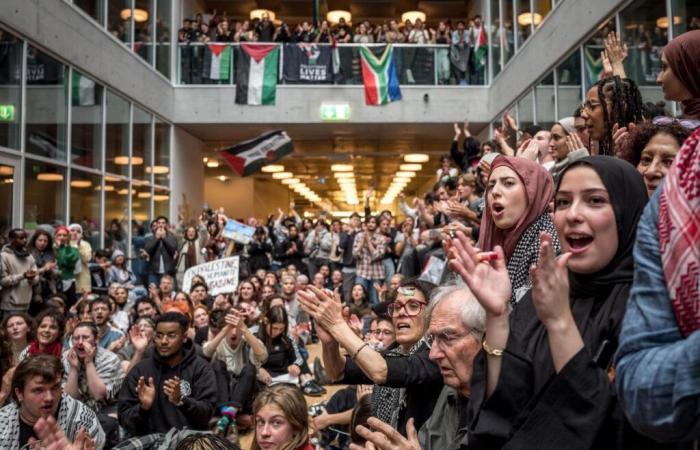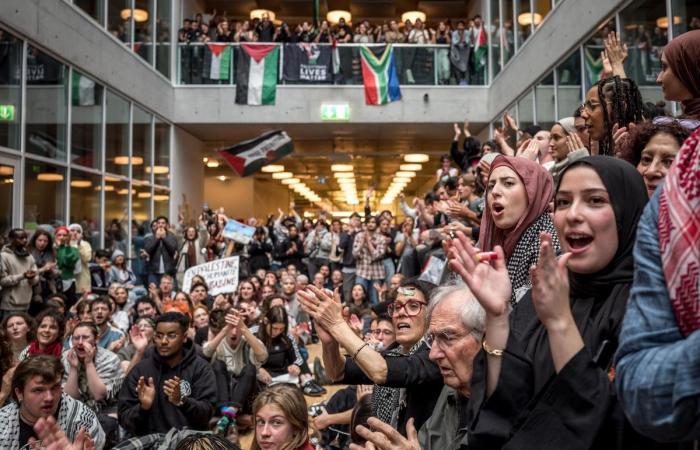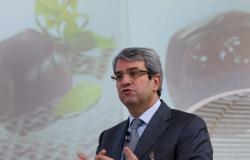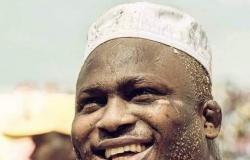Higher education institutions –
A climate of intimidation reigns on campuses
Activists are everywhere and are scary. There is a danger of “potential extremism”, notes a letter to the management of EPFL. UNIL filed a complaint for depredations and denunciation. Security measures are reinforced in Dorigny.
Published today at 7:15 p.m.
Pro-Palestinian students and sympathizers during the occupation of the University of Lausanne in May.
AFP
Subscribe now and enjoy the audio playback feature.
BotTalk
- The University of Lausanne has filed a criminal complaint for pro-Palestinian denunciations and graffiti.
- Jewish and Israeli students feel threatened by anti-Israeli activities.
- EPFL is strengthening its security measures after incidents involving pro-Palestinian demonstrators.
Bright red graffiti appeared on the Dorigny campus: “Genocide in Gaza, UNIL complicit.” This week, the University of Lausanne filed a complaint for blurring. For months, pro-Palestinian groups have been calling for a boycott of Israel. As UNIL did not intervene, a list is circulating, denouncing professors and assistants who have links with Israeli universities.
Last week, a letter signed by 80 people was delivered to the EPFL management. Entitled “Potential extremism and biased teaching,” the 30-page message explains why Jewish and Israeli students and employees at the polytechnic are increasingly destabilized.
Since last fall, a climate of intimidation has reigned on campus. Stickers and leaflets in favor of the liberation of Palestine are flourishing, slogans calling into question the existence of Israel rub shoulders with apologies for armed resistance.
The letter denounces the presence of aggressive students, activist professors in solidarity with these actions and speakers propagating a unilateral vision of the conflict in the Middle East. Conclusion: “The so-called pro-Palestinian organizations currently operating on the EPFL campus are not pro-Palestinian, but rather anti-Israeli.”
At EPFL, a leaflet was circulated calling for the disruption of an event by the Jewish student association Shalom, supposedly representing “weapons manufacturers and Israel’s genocidal regime.” The security system has been reinforced for the occasion.
On October 9, 2024, which marked the anniversary of the terrorist attack against Israel, around 300 demonstrators marched between UNIL and EPFL, accusing the Haute École of complicity in genocide. Red paint was spread on the ground, symbolizing “the blood on the hands of the institution.”
A provocation, explains Jacques Ehrenfreund, professor of Jewish studies at UNIL: “The bloody palms are an allusion to a lynching which took place in Ramallah in 2000.” A Palestinian assassin stretched his bloodied hands out the window after killing two Israeli soldiers. For a long time, Jacques Ehrenfreund has observed with concern the climate which reigns at the university. He would like a more muscular reaction.
How does the EPFL management react? When questioned, Kathryn Hess Bellwald, assistant vice president for student affairs, said she was sensitive to the position of the authors of the letter. However, as the demonstration took place on public property outside the buildings, it was decided to observe without intervening. “The situation is very complex,” she explains.
Our reporter spoke with half a dozen people, who wish to remain anonymous. They all fear hostility. A teacher from the University of Geneva emphasizes that “since December 2023, these activists have been everywhere”.
“Freedom of expression is a fundamental principle […] but it is limited by clear guidelines. We reject any form of incitement to violence, discrimination, Islamophobia and anti-Semitism,” specifies the University of Geneva.
Currently, the name of Joseph Daher is circulating in Lausanne. This Swiss and Syrian professor visiting UNIL also gives courses at EPFL. He presents himself as an activist. On October 9, he claimed that the State of Israel practices apartheid.
Daher apparently does not distinguish between his roles as activist and teacher. Kathryn Hess Bellwald points out that if a professor “behaves in an activist way, it’s delicate, but it falls under freedom of expression. In addition, Joseph Daher is only a guest professor with us. It would therefore be up to the University of Lausanne to react.” A conference on “the history and ideology of Zionism” is announced for the end of November at the University of Geneva. Joseph Daher will be one of the speakers. When requested, UNIL did not react to our requests.
“Latest news”
Want to stay on top of the news? “24 Heures” offers you two appointments per day, directly in your email box. So you don’t miss anything that’s happening in your Canton, in Switzerland or around the world.
Other newsletters
Log in
Andreas Kunz is a member of the editor-in-chief of SonntagsZeitung.More info
Did you find an error? Please report it to us.
1 comment







